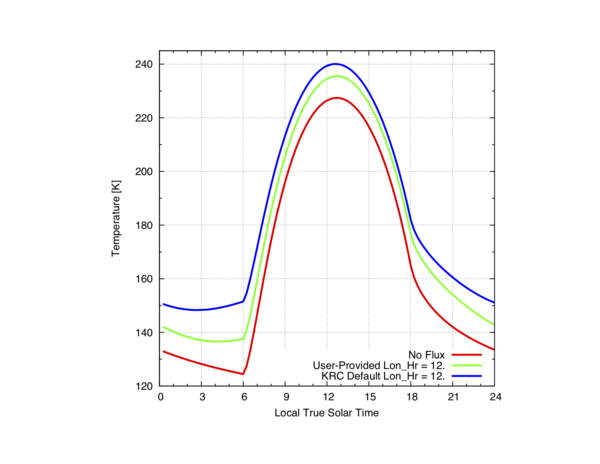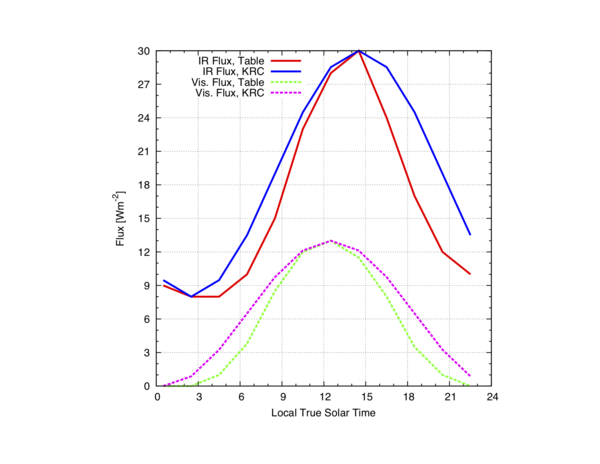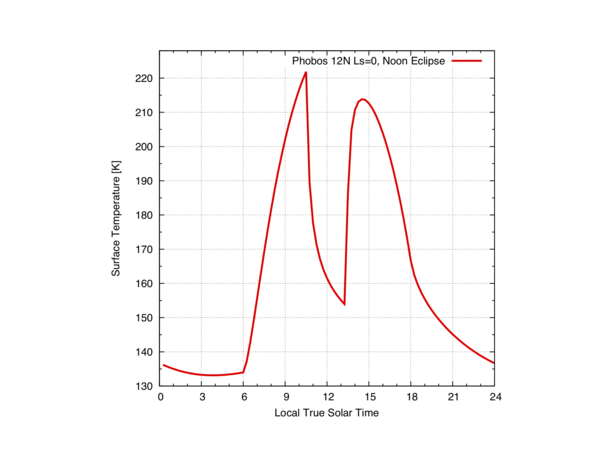KRC for Phobos
Contents |
Basic Case
Phobos models require to specify body = "Phobos"
out = krc(lat = 12. ,INERTIA = 50. ,body = "Phobos", LKofT = "T")
Fluxes from Mars
Generally, Phobos modeling requires the addition of the visible and IR fluxes from Mars:
out = krc(lat = 12. ,INERTIA = 50. ,body = "Phobos", LKofT = "T", PFlux = "T", Lon_Hr = 8.)
...if standard flux values are acceptable (i.e., broad assumption on Mars surface temperature, and albedo). Fluxes are set with PFlux = "T", and by setting Lon_Hr.
Lon_Hr is the surface longitude relative to the sub-Mars point, expressed in hours. Phobos being tidally locked, Lon_Hr = 12. is the sub-Mars point (max fluxes), and 0. for the center longitude of Phobos hidden face. Note 18 < Lon_Hr%24 < 6 corresponds to the Phobos hidden face, so no fluxes are contributed in these cases.
Generally, for tidally locked bodies, the sub-planet point (sub Mars point for Phobos is located ~ at longitude = 0), so that Lon_Hr can be derived from the longitude modeled on Phobos ore any tidally locked body:
Lon_Hr = (24/360 x (180 - longitude west))%24
Alternatively, the user can provide Visible and IR fluxes versus local time (krc_planetary_flux_table() generates the input parameters). An external model or a set of dedicated KRC runs can be used to determine the IR and Visible flux versus local time, as seen from Lon_Hr and the specified latitude. The figure below shows the externally provided values ("IR External Model", and "Vis External Model", the associated sin fits fed to KRC by the interface ("IR KRC Fit", and "Vis KRC Fit"), and the difference between the external forcing and the KRC forcing ("KRC - External Model").
Note that a user might want to consider reducing the average difference between the KRC Fit and the Eternal model by fine tuning the fits.
In this case, the flux from Mars on Phobos can be formalized like this:
out = krc(lat = 12. ,INERTIA = 50. ,body = "Phobos", LKofT = "T", PFlux = "T",Lon_Hr = 8., IR = IR, Vis = Vis)
See below a comparison of the predicted surface temperature with and without Mars IR and visible shine on Phobos:
 Comparison between No Flux, and Flux at the Sub Mars point
Comparison between No Flux, and Flux at the Sub Mars point
 Comparison between No Flux, and Flux received from the hidden face (none), i.e., no forcing.
Comparison between No Flux, and Flux received from the hidden face (none), i.e., no forcing.
Mars Eclipses
To include the eclipse by Mars using standard Phobos/Mars orbital properties:
Eclipse = "T" #forces an eclipse (Default = "F") Eclipser = "Mars" #Eclipser name Ecl_Cent_Hr = 12. #Eclipse central hour Bias = 0.0 #Eclipse Bias (0 => perfect alignement; 1 => partial eclipse) Eclipse_Style = 1 Date = 0.
out = krc( lat = 12. ,INERTIA = 50. ,body = "Mars,Phobos", LKofT = "T", PFlux = "T",Lon_Hr = 8., Eclipse = Eclipse, Eclipser = Eclipser, Ecl_Cent_Hr = Ecl_Cent_Hr, Bias = Bias, Eclipse_Style = Eclipse_Style,Date = Date)
out = krc( lat = 12. ,INERTIA = 50. ,body = "Mars,Phobos", LKofT = "T", PFlux = "T",Lon_Hr = 8., IR = IR, Vis = Vis, Eclipse = Eclipse, Eclipser = Eclipser, Ecl_Cent_Hr = Ecl_Cent_Hr, Bias = Bias, Eclipse_Style = Eclipse_Style,Date = Date)
When working with Phobos eclipses, it may be beneficial to increase the time resolution of the output by increasing N24
out = krc( lat = 12. ,INERTIA = 50. ,body = "Mars,Phobos", LKofT = "T", PFlux = "T",Lon_Hr = 8., IR = IR, Vis = Vis, Eclipse = Eclipse, Eclipser = Eclipser, Ecl_Cent_Hr = Ecl_Cent_Hr, Bias = Bias, Eclipse_Style = Eclipse_Style,Date = Date, N24 = 96 * 100)
Notes about the Default Material Properties
Comment here on the default material properties used by the interface.


